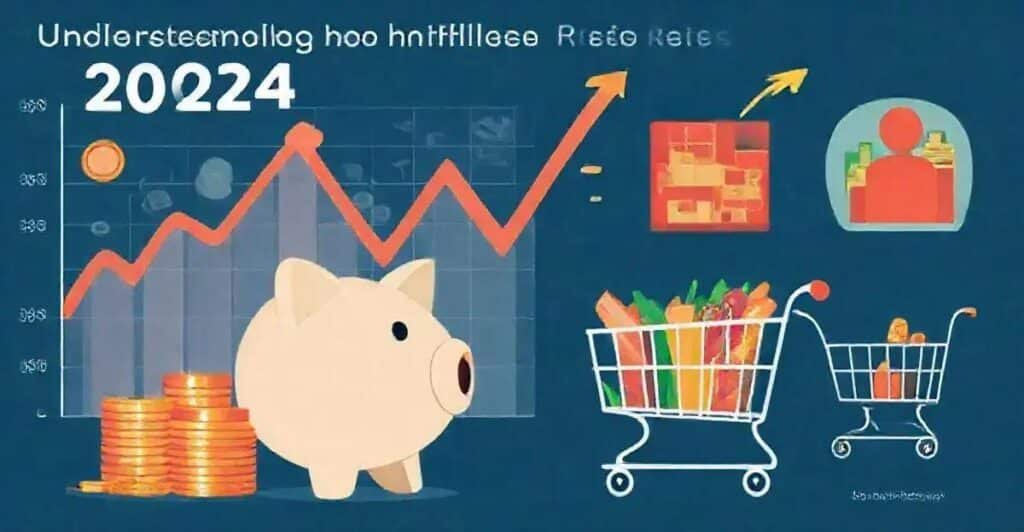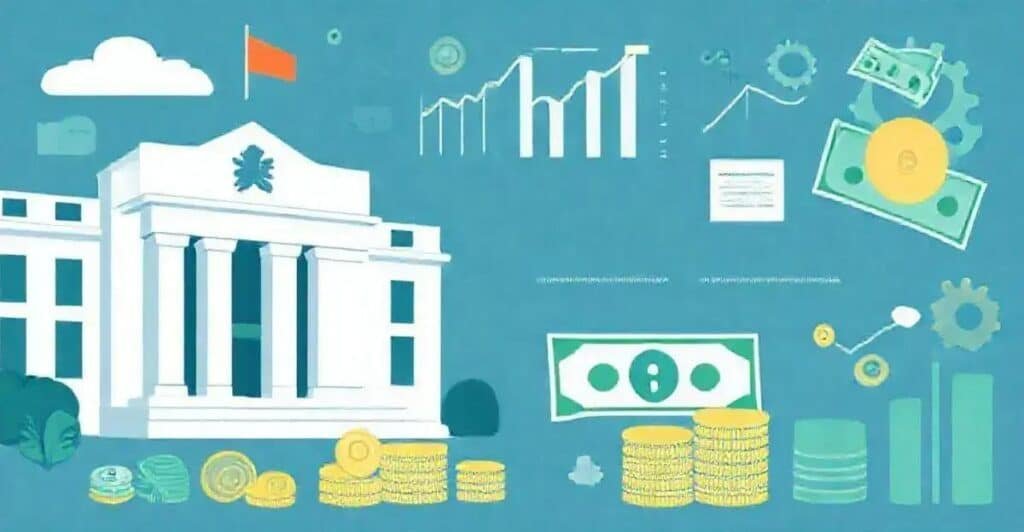In today’s economy, understanding inflation rates is crucial to making informed financial decisions.
As the cost of living continues to rise, it’s essential to know how inflation rates can impact your purchasing power and savings.
In this article, we’ll delve into the effects of inflation rates on your finances, and provide you with practical tips on how to minimize its impacts.
Inflation Rates: A Threat to Your Wallet
Inflation rates can have a significant impact on your wallet, eroding the purchasing power of your hard-earned money. As prices rise, the value of your savings and investments can decline, making it challenging to achieve your financial goals. If left unchecked, high inflation rates can lead to a decrease in the standard of living, making it difficult to afford essential items and services.
Inflation can have a devastating effect on your savings and investments. As prices rise, the returns on your investments may not keep pace, resulting in a decline in their value. Similarly, inflation can erode the purchasing power of your savings, making it difficult to achieve your long-term financial goals. It’s essential to understand how inflation affects your savings and investments to make informed decisions and protect your financial future.
Inflation affects the cost of living in various ways. As prices rise, the cost of essential items such as food, housing, and healthcare can increase, making it challenging for individuals and families to make ends meet. Inflation can also lead to a decrease in the value of your salary, making it difficult to maintain your standard of living.
The relationship between inflation and unemployment is complex and often debated among economists. While high inflation rates can lead to an increase in unemployment, low inflation rates can also lead to a decrease in economic activity and job creation. Understanding the relationship between inflation and unemployment is crucial to making informed decisions about monetary policy and economic growth.
Inflation rates can be confusing and overwhelming for beginners. However, understanding the basics of inflation rates can help you make informed decisions about your finances. This guide will provide you with a comprehensive overview of inflation rates, including the causes, effects, and how to protect your financial future.
Inflation and the economy are intricately linked. High inflation rates can lead to a decrease in economic growth, while low inflation rates can also lead to a decrease in economic activity. Understanding the complex relationship between inflation and the economy is crucial to making informed decisions about monetary policy and economic growth.
The Impact of Inflation on Savings and Investments
The impact of inflation on savings and investments is multifaceted. As prices rise, the purchasing power of your savings declines, making it challenging to achieve your long-term financial goals. Similarly, inflation can erode the returns on your investments, such as stocks and bonds, reducing their value. It’s essential to understand how inflation affects your savings and investments to make informed decisions and protect your financial future.
Inflation rates can have a significant impact on your wallet, eroding the purchasing power of your hard-earned money. As prices rise, the value of your savings and investments can decline, making it challenging to achieve your financial goals. If left unchecked, high inflation rates can lead to a decrease in the standard of living, making it difficult to afford essential items and services.
Inflation affects the cost of living in various ways. As prices rise, the cost of essential items such as food, housing, and healthcare can increase, making it challenging for individuals and families to make ends meet. Inflation can also lead to a decrease in the value of your salary, making it difficult to maintain your standard of living.
The relationship between inflation and unemployment is complex and often debated among economists. While high inflation rates can lead to an increase in unemployment, low inflation rates can also lead to a decrease in economic activity and job creation. Understanding the relationship between inflation and unemployment is crucial to making informed decisions about monetary policy and economic growth.
Inflation rates can be confusing and overwhelming for beginners. However, understanding the basics of inflation rates can help you make informed decisions about your finances. This guide will provide you with a comprehensive overview of inflation rates, including the causes, effects, and how to protect your financial future.
Inflation and the economy are intricately linked. High inflation rates can lead to a decrease in economic growth, while low inflation rates can also lead to a decrease in economic activity. Understanding the complex relationship between inflation and the economy is crucial to making informed decisions about monetary policy and economic growth.
How Inflation Affects the Cost of Living
Inflation can have a significant impact on the cost of living, as prices rise for essential items such as food, housing, and healthcare.
This can lead to a decrease in the purchasing power of individuals, making it challenging to afford the necessities of life.
For example, a 2% inflation rate can increase the cost of food by 10%, making it difficult for low-income households to afford a balanced diet.
The Relationship Between Inflation and Unemployment
The relationship between inflation and unemployment is complex and multifaceted.
While high inflation rates can lead to an increase in unemployment, low inflation rates can also lead to a decrease in economic activity and job creation.
This is because inflation can affect the cost of living, making it more expensive for businesses to operate and hire employees.
Additionally, inflation can erode the purchasing power of consumers, leading to decreased demand for goods and services.
Understanding Inflation Rates: A Guide for Beginners
Inflation rates can be a complex and confusing topic, especially for beginners. However, understanding the basics of inflation rates is crucial to making informed decisions about your finances.
This guide will provide you with a comprehensive overview of inflation rates, including the causes, effects, and how to protect your financial future.
We will explore the different types of inflation, such as consumer price inflation and producer price inflation, and discuss how they can impact your daily life.
Inflation and the Economy: A Complex Relationship
Inflation and the economy are intertwined, with inflation having a significant impact on economic growth and stability.
High inflation rates can lead to a decline in economic activity, as businesses and consumers adapt to the changing economic landscape.
Conversely, low inflation rates can lead to a decrease in economic activity, as consumers and businesses become cautious about spending and investing.
Understanding the complex relationship between inflation and the economy is crucial for policymakers and businesses to make informed decisions about monetary policy and economic growth.
FAQ – Frequently Asked Questions About Artificial Intelligence for Small Businesses
What are the benefits of automating tasks for my small business?
Automating tasks frees up your team from repetitive activities, increasing productivity and allowing them to focus on more strategic tasks.
What tools can I use for data analysis?
There are several tools available, such as Google Analytics, Tableau, and Microsoft Power BI, that help collect and interpret valuable data.
What are chatbots and how do they improve customer service?
Chatbots are virtual assistants that can answer questions and resolve problems at any time, improving the customer experience and freeing up your team.
How can I personalize the customer experience?
Through data analysis, you can better understand customer preferences and offer personalized recommendations and promotions.
Why is customer feedback important?
Feedback is essential for identifying areas that need improvement and adjusting your strategy to ensure customer satisfaction.
Is artificial intelligence accessible for small businesses?
Yes, there are many AI solutions that are accessible and scalable for small businesses to improve efficiency and customer service.




